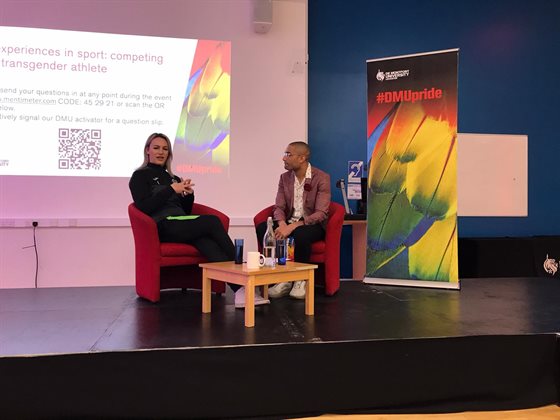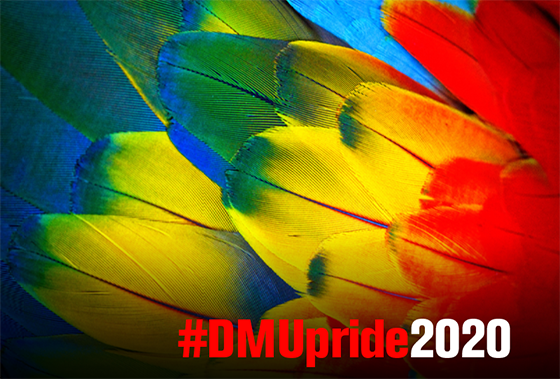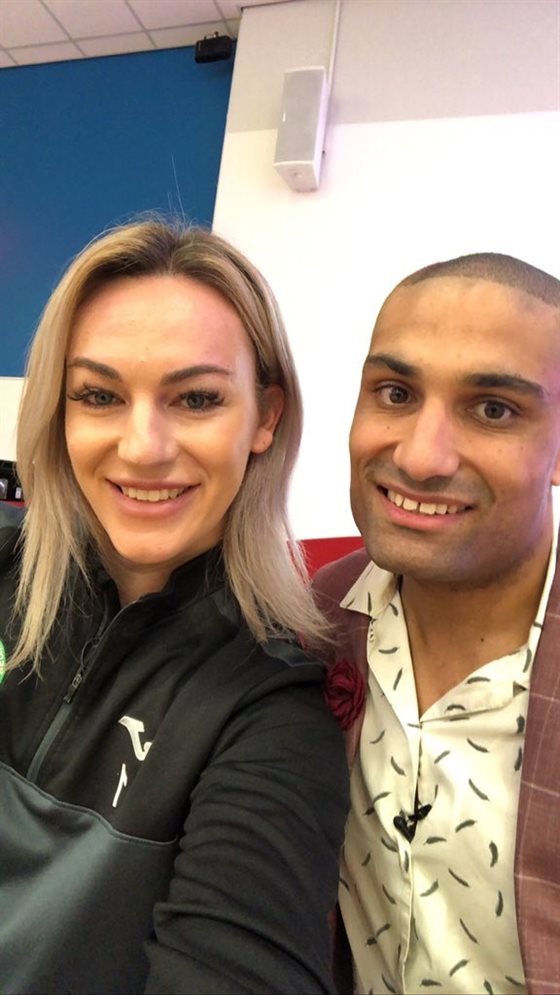Competing as a transgender athlete is one of the most talked about topics in sport today.
Just last week, the families of three female high school runners in Connecticut, USA, filed a federal lawsuit to block transgender athletes from participating in girls’ sports, arguing that people with male anatomy have an unfair advantage and are depriving them of track titles and success in their sport.

In response, transgender athletes from around the world have spoken out about how participating in sport has changed – and in some cases, even saved – their lives.
As part of #DMUPride month, BBC Radio 2 Breakfast show presenter Richie Anderson hosted a special event for staff and students at De Montfort University Leicester (DMU), where he was joined by Leicester-born footballer Chloe Quinn, as she shared her own experiences of being a transgender woman in sport.
“Being trans in sport isn’t great. I’m constantly anxious how I’m perceived whether that’s how I look or how I sound on the pitch,” said Chloe (37). “But joining a football team was massive for me, especially so early on in my transition. It helped me find myself.”
Chloe, who started transitioning from male to female in 2015, said she always knew she was transgender, ever since she was a young child.
“I hid who I was for such a long time because I was so worried about how I would be perceived, especially growing up in the 1980s,” she said. “I remember seeing a documentary about being transgender and I really related to it, so I decided to go to a gender clinic. It was then that I was diagnosed with gender dysphoria.”
Gender dysphoria is a condition where a person experiences discomfort or distress because there's a mismatch between their biological sex and gender identity.
By 2016, Chloe was a year into her hormone therapy. “Those hormones change your body like you would not believe,” she said. “I had become a bit of a recluse because I was not happy with the way I looked or sounded and I was worried what people would think.
“My friends wanted to get me out of the house so we started playing five-a-side football and having a kick around. I really enjoyed it and I got to thinking about joining a local team. I found a couple of women’s teams that were recruiting but I didn’t tell them I was transgender to begin with. I was really nervous and didn’t know how they would react.
“I remember when I went for my trial session at Oadby & Wigston Ladies it took me about half an hour just to get out the car. I was watching them on the pitch and I was ready to drive away. I didn’t know what to expect and I feared rejection. I worried people would point and laugh.
“Driving away would have been giving up though and I’m so glad I confronted my fears because I have gained so many new friends through playing football.”

After a couple of training sessions Chloe was invited to meet with the manager and the captain to discuss her joining the squad.
“I walked into the clubhouse and there were four or five people sat there waiting to talk to me,” she said. “They told me they wanted me to be part of the club but they had never had a transgender player before and weren’t sure how to approach the situation.”
Chloe explained that she had already been in touch with the FA (Football Association) and that they had provided her with a letter to confirm she is eligible to play in a women’s team.
“There are criteria that you have to meet – you have to have lived as a female for two years before you can play in a competitive league and you also have to have your testosterone, oestrogen and blood levels measured to check you are within female range,” she said.
With the full support of her club and teammates, Chloe spent two-and-a-half years playing as a centre back for Oadby & Wigston Ladies. It was during her time there that she underwent surgery and completed her transition.
However, it wasn’t always plain sailing as a transgender woman in football.
“Not long after I joined the team we were playing a rival team who brought along a club photographer. It’s always nice when a club photographer is there because they get some great action shots, so I was looking forward to seeing them,” she said.
Later that day, Chloe’s friend called to say the photos from the match had been uploaded onto Facebook and that there were some horrible comments about her, including one that read: ‘I went to watch a women’s football game and there was a man in a wig.’
“It was awful. It made me feel like I didn’t fit in and that I was doing something wrong in my transition,” said Chloe. “Luckily my club dealt with it really well. The manager wrote a complaint to the league and sanctions were put in place.
“I think that’s the key to making sport more inclusive for the transgender community – having the support of your coaches, managers and teammates.
“We’ve still got a long way to go but the first step is just to talk more and be open about who you are. I think it would also be good if clubs could make it clearer that they are LGBT friendly – maybe they could add a LGBT flag to show their support.
“You hear these stories where transgender people are told they have to use a different changing room or toilet – if that had happened to me I wouldn’t have felt part of the team. Thankfully the girls I’ve played with have always been so supportive.”
RELATED NEWS
Students help curate DMU Pride Festival at prestigious Curve theatre
Find out more about #DMUPride
Leicester sports stars share their experiences of overcoming adversity
In 2019, Chloe moved to national league side Bedworth United, where she now plays in goal.
“Before I played football I was not very confident but the girls in both of my teams have been so supportive and have always been there with a shoulder to cry on.”
Speaking about the #DMUPride event, Richie – an award-winning broadcaster who bravely came out as gay to his Sunday morning football team on BBC’s The One Show – said talking about LGBT barriers is vital.
“When we look at the way that people have talked about transgender people over the last few years, it’s clear to see that more needs to be done,” he said. “If we spoke about gay or black people in the same way it would not be accepted.
“I think it is fantastic that DMU has its own pride event. When I was university we didn’t have anything like this and I think it would have really helped me, as a gay student who had not yet come out, to know that other people were in the same boat.
“Hopefully in the future we won’t need to be hosting events like this because LGBT people will just be accepted and there won’t be a discussion to be had.”

2020 marks the sixth year of #DMUpride celebrations, with a jam-packed month of events taking place on campus and across the city to celebrate LGBTQ+ history month. For more information visit: www.dmu.ac.uk/events/pride/index.aspx
Posted on Friday 21 February 2020